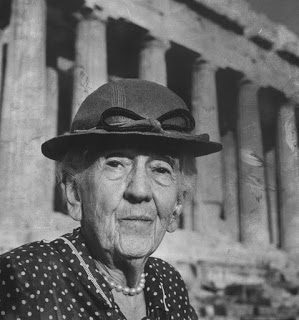“All things are at odds when God lets a thinker loose on this planet”: Edith Hamilton

In 1958, when Edith Hamilton was ninety-one years old, Life magazine declared her to be the world’s “greatest living woman classicist”. She lived to the age of ninety-five, and was described by The New York Times as the classical scholar who “brought into clear and brilliant focus the Golden Age of Greek life and thought … with Homeric power and simplicity in her style of writing”.

Describing her childhood in Indiana, she said,
My father was well-to-do, but he wasn’t interested in making money; he was interested in making people use their minds.
Her father guided her towards the Classics, and, when she was seven years old, he began teaching her Latin, then French, German, and Greek.
Edith travelled with her sister, Alice, to Germany to study humanities and classics at Leipzig, but discovered that women were still not allowed to earn a doctoral degree. The situation didn’t improve when she moved to the University of Munich, either.
Alice writes in her biography that when Edith arrived, “she was forced instead to sit on a chair up on the platform beside the lecturer, facing the audience, so that nobody would be contaminated by contact with her.”
She remembered Edith saying, “The head of the University used to stare at me, then shake his head and say sadly to a colleague, ‘There now, you see what’s happened? We’re right in the midst of the woman question.’”
Yet Edith went on to write several landmark texts on the classics, including The Greek Way (1930). It was here, in her earliest exploration of “the calm lucidity of the Greek mind”, that she wrote of Aeschylus,
Life for him was an adventure, perilous indeed, but men are not made for safe havens. The fullness of life is in the hazards of life. And, at the worst, there is that in us which can turn defeat into victory.
This is a wonderful quote–one of my favourites–and is included in David Brooks’s The Social Animal. If you hadn’t read this, it’s a superb “story” of the lives of two fictional characters that is intersected with psychological, biological and sociological explanations of their motives, growth and discoveries as they progress through life.
To reference another quote from Hamilton, “All things are at odds when God lets a thinker loose on this planet” (The Greek Way).
Enjoy more from me
- Retreat into my new book, Your Life in Bloom: Finding Your Path and Your Courage, Grounded in the Wisdom of Nature.
- I'm also the author of Mountain Song: A Journey to Finding Quiet in the Swiss Alps, a book about my time living alone by the mountains.
- If you love books, are feeling a little lost right now, and would love some gentle comfort and guidance, join The Sanctuary, my seven-day course to rebalance your life.
